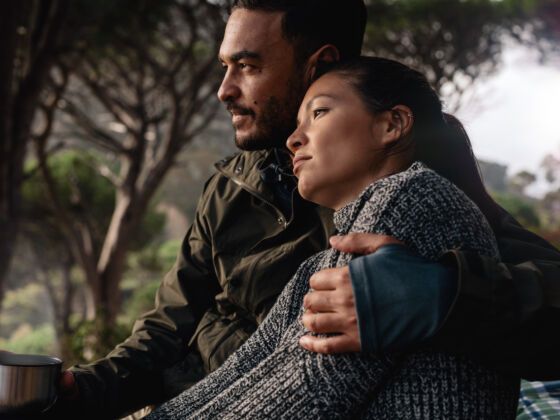“Where in the Orient did you meet your wife?” asked the man in his sixties sitting beside me on the boat. We were heading to a small island off the coast of Borneo and had reached a lull in our conversation in which he had given me, in one more or less grammatically coherent sentence, his entire personal history from boyhood in Missouri, to his Mormon missionary work in Malaysia, to his current semi-retirement in Idaho.

Traveling As A Mixed-Race Couple In Asia: No, Sir, I Did Not Buy My Wife
There is a lot of subtext crammed into the nine-word question “Where in the Orient did you meet your wife?” even when you exclude the geographical relic of the term “the Orient.” As I explained that even though Aileen’s parents are from Taiwan, she has lived in New York City all her life and that, subtextually, I didn’t rescue her from a pimp in Shanghai, the light in his eyes dimmed. After I finished he sat for a moment, staring at the waves, and then looked up and said, “Huh. Well isn’t that nice.”
Now maybe it’s unfair to expect a sixty-something former missionary in tube socks and sandals to be one-hundred percent politically correct when he phrases a sentence, but I was annoyed – not at the man but at the question. Very nearly every other tourist Aileen and I meet west of the International Date Line asks us us some variation of that question. No one has ever interrogated a family of fat, fanny-pack wearing Europeans about their origin story, but if you travel as part of a Asian/Caucasian pair, you can expect the third degree throughout your trip.
Interracial couples are common enough in the United States (except apparently in Idaho) that even the term “interracial” has a kind of quaint, backwards tinge to it. You’re really only only likely to hear the word used nowadays by racists, pornographers or statisticians.
Head over to South East Asia, where the confluence of economic inequality, cheap airfares, and high divorce rates has made the region the go-to destination for the recently dumped gentleman to find a woman for companionship, and the sight of a mixed couple tends to have less than positive connotations. Tourists in the region seem to be hard-wired to react to any heterogeneous racial pairing with leers, snickers, and loaded questions about where you met your wife.
These reactions do vary somewhat by country but they never completely disappear. In Singapore and Kuala Lumpur other tourists hardly seem to notice us, while Thailand – where the vision of local women giddily weaving their fingers through the ample chest-hair of Western men several decades their senior has ingrained itself into the tourist landscape along with the Grand Palace and gut-shattering spicy food – is pretty much a poisoned well as far as being able to walk around without getting the stink-eye from other travelers goes.
(Not that Aileen and I are entirely above this kind of cattiness. We once walked down a busy street in Phuket yelling out “midlife” every time we passed a mixed couple in an attempt to get a statistically valid frequency measurement).
There are two groups of people who don’t seem to be put off by us. The first is locals. People generally know whether or not someone is from their homeland, and so it’s not surprising that most natives of our host countries don’t immediately leap to the conclusion that my life partner was purchased in the seedy bar around the corner.
This is not to say that they have never made any incorrect assumptions about Aileen and I. They just make the wrong ones. We have had many recursive, Abbot-and-Costello style conversations with people who have vapor-locked when confronted with a woman which they had presupposed to be a Chinese National speaking in perfect American English.
“Excuse me, Peter, where is Aileen from?”
“New York.”
“But she looks … Chinese?”
“Her parents are from Taiwan.”
“But she speaks English…”
“Well she’s from New York.”
“But she looks…Chinese?”
“Her parents are from…look, can I just have a coffee?”
Or, as one Indonesian woman put it, “I was confused because…she looks like…us, only more,” before pulling her eyelids back.
The second group is the men in the mixed couples. They do seem to make the same assumptions that other tourists do, but instead of acting superior, they exhibit gestures of kinship. They nod at us, the way two guys in Yankees caps might nod at each other on the streets of New York. They mark us as the people in the crowd that they can come and talk to.
In the departure lounge in the domestic terminal Bangkok, a couple – a 50-ish German man and a 30-ish Thai woman – were arguing a few seats down from us, alternating snippy comments back and forth in a mixture of Thai and German until the man stood up with a gesture that translates – in any language – to “Oh yeah, well I’ll prove it then.”
He strode over to Aileen and asked her a barrage of questions, each increasing in intensity, about where the bars are in Phuket. After several minutes of what the UN would categorize as a “minor international incident” the man stopped and said, “Oh, you’re not from this country” before wandering back to his companion who was attempting to bore small holes in his head with her eyes.
Many people travel to challenge their assumptions. Aileen and I seem to have ended up challenging other people’s assumptions through the act of travel.
So one last time, yes, she speaks English. No she wasn’t purchased down the street.
And no one has called it the Orient for fifty years.